| Srl | Item |
| 1 |
ID:
117506
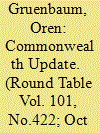

|
|
|
| 2 |
ID:
117512
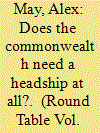

|
|
|
|
|
| Publication |
2012.
|
| Summary/Abstract |
The Queen's impact as Head of the Commonwealth has been a remarkable one. Catapulted into the job at the age of 25, she has filled it for more than 95% of its existence and has impressed it with her own personality: gracious, dignified, charming, interested in other people, morally impeccable, politically absolutely neutral, and without a trace of arrogance or self-satisfaction. Just as most British republicans (a small group), when scratched, agree that it would have been impossible to have had a better head of state than Queen Elizabeth II, so it is almost impossible to find any grounds on which to criticise her conduct as Head of the Commonwealth.
|
|
|
|
|
|
|
|
|
|
|
|
|
|
|
|
| 3 |
ID:
117507
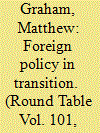

|
|
|
|
|
| Publication |
2012.
|
| Summary/Abstract |
At the beginning of the transition from apartheid to democracy, the African National Congress (ANC) was unprepared for foreign policy discussion, a lack of readiness magnified by the collapse of international Communism and the Cold War ideology. President De Klerk and the National Party controlled foreign policy in the early years of the transition and began the process of reintegration with the international community, The ANC initially struggled to adapt to the new international situation, whereas De Klerk was successful in wooing the international community. In the later stages of transition, the ANC developed a greater sense of direction and substance in foreign relations, although there were differences of opinion among and between the leadership and the rank and file. Already in 1994 there was evidence of tension between idealism and pragmatism. Post-apartheid foreign policy under Mandela was riddled with inconsistencies, which stemmed from the events of South Africa's transition
|
|
|
|
|
|
|
|
|
|
|
|
|
|
|
|
| 4 |
ID:
117514
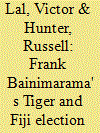

|
|
|
|
|
| Publication |
2012.
|
| Summary/Abstract |
Riding the tiger is a hazardous sport. To fall off it or to attempt to dismount it, even, is to be eaten; and it is precisely this predicament that the South Pacific region's first and only military strongman finds himself in Fiji.
On 5 December 2006 Commodore Josaia Voreqe (Frank) Bainimarama deposed a lawfully elected multi-party SDL-FLP government by force of arms. This was, as he and his inner circle are well aware, nothing short of treason for which the penalty is life imprisonment. So he now seeks to be somehow spirited from the tiger's back by a promise of elections in 2014 and the construction of yet another constitution under the chairmanship of Kenyan professor Yash Ghai.
|
|
|
|
|
|
|
|
|
|
|
|
|
|
|
|
| 5 |
ID:
117508
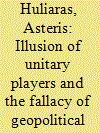

|
|
|
|
|
| Publication |
2012.
|
| Summary/Abstract |
Journalists, academics and politicians portray the European Union and China as unitary actors that follow coherent strategies towards 'Africa'. These perceptions help in turn to sustain a discourse of geopolitical competition: the EU and China are presented as bitter rivals of a new 'Cold War'. This 'new scramble for Africa' narrative is an illusion. Despite official declarations, Brussels' ties with 'Africa' are only a small part of a complex web of relationships. Moreover, China's presence in Africa is far less monolithic than outside observers assume. However, these flawed perceptions are quite persistent because they serve the ambitions and interests of governing elites.
|
|
|
|
|
|
|
|
|
|
|
|
|
|
|
|
| 6 |
ID:
117509
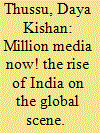

|
|
|
|
|
| Publication |
2012.
|
| Summary/Abstract |
India's growing profile on the global scene owes much to the vibrancy of its cultural and creative industries, media and telecommunications. This article analyses India's media in terms of four 'dividends' (and their corresponding deposits): democractic, diasporic, digital and demographic. Although the deficits produce considerable challenges, the dividends are stronger and the author is optimistic about India's capacity for development and ability to lead to globalisation with an Indian flavour. He reflects on India's potential contribution to international media studies, especially in relation to liberal pluralism, representation of Islam and discourses about development.
|
|
|
|
|
|
|
|
|
|
|
|
|
|
|
|
| 7 |
ID:
117511


|
|
|
| 8 |
ID:
117510


|
|
|
|
|
| Publication |
2012.
|
| Summary/Abstract |
Jamaica is one of the few Commonwealth countries that still recognises the Privy Council in London as its court of final appeal. This article argues that the monarchy in Jamaica should be replaced by a republican form of government and that the Privy Council should be replaced as the final appellate tribunal by the Caribbean Court of Justice. In the view of the author, this is an issue that goes to the heart of the identity and self-image of the Jamaican people, and it is rooted in the cry for freedom of Jamaicans' enslaved ancestors.
|
|
|
|
|
|
|
|
|
|
|
|
|
|
|
|
| 9 |
ID:
117516


|
|
|
|
|
| Publication |
2012.
|
| Summary/Abstract |
The 18th Conference of Commonwealth Education Ministers (CCEM) in Mauritius (28-31 August 2012) backed a proposal by the Government of Malaysia to establish a new agency for tertiary education. The Commonwealth Tertiary Education Facility will be based at the National Higher Education Research Institute, University Sains Malaysia, Penang, Malaysia.
The Commonwealth Tertiary Education Facility (CTEF) will advise member states and institutions on how best to manage and develop their higher education systems in line with best international practice. Acting as a consultancy, it will collect information and act as a clearing house for ideas that it is hoped will lead to a faster rate of improvement than if member states and their higher education institutions were left to their own devices.
|
|
|
|
|
|
|
|
|
|
|
|
|
|
|
|
| 10 |
ID:
117515
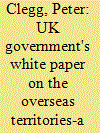

|
|
|
|
|
| Publication |
2012.
|
| Summary/Abstract |
On 28 June 2012 the long-awaited White Paper on the Overseas Territories subtitled Security, Success and Sustainability was published by the UK government. The White Paper sets out the nature of the existing links between the UK and its 14 Overseas Territories and the measures required to 'renew and strengthen' the relationship. The Coalition government felt-perhaps correctly-that towards the end of the Labour Party's time in power relations with at least some of the Territories were becoming increasingly fractious, and several political and economic problems in the Territories required stronger corrective action. Thus, the White Paper attempts a balance between promoting a more positive overall agenda while making clear the responsibilities and high standards of governance the Territories must maintain.
|
|
|
|
|
|
|
|
|
|
|
|
|
|
|
|
| 11 |
ID:
117513
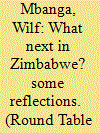

|
|
|
|
|
| Publication |
2012.
|
| Summary/Abstract |
Zimbabwe today is characterised mainly by two things: polarisation and fear. Nobody trusts anybody. A few people, mostly politicians and the top brass in the armed forces, are fabulously wealthy while the majority are dirt poor.
There is endemic corruption in every sector. The Attorney General said recently the police were so badly paid nobody should be surprised if they helped themselves to a bit on the side.
|
|
|
|
|
|
|
|
|
|
|
|
|
|
|
|